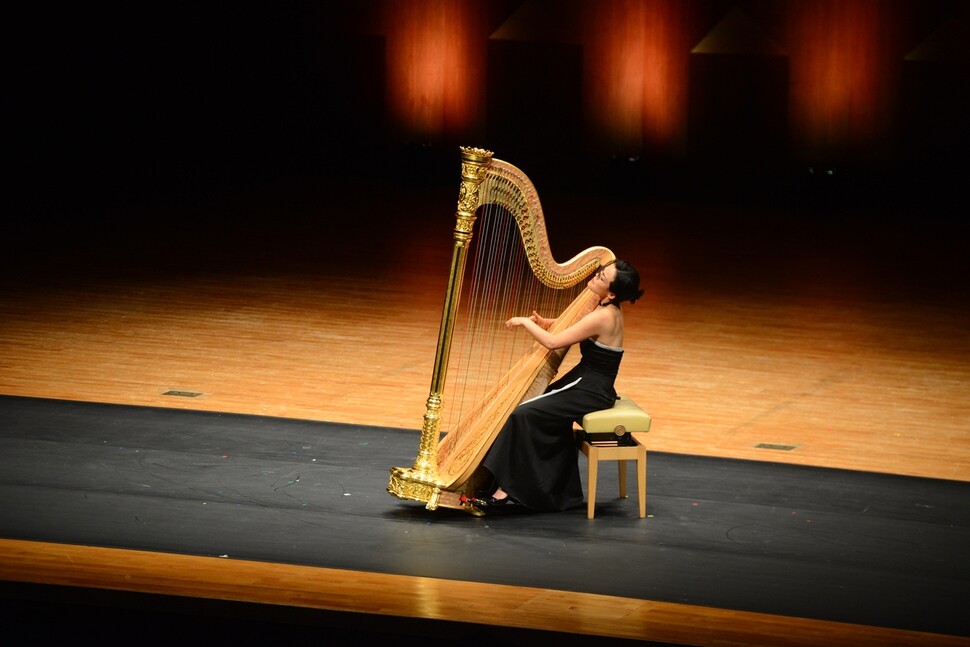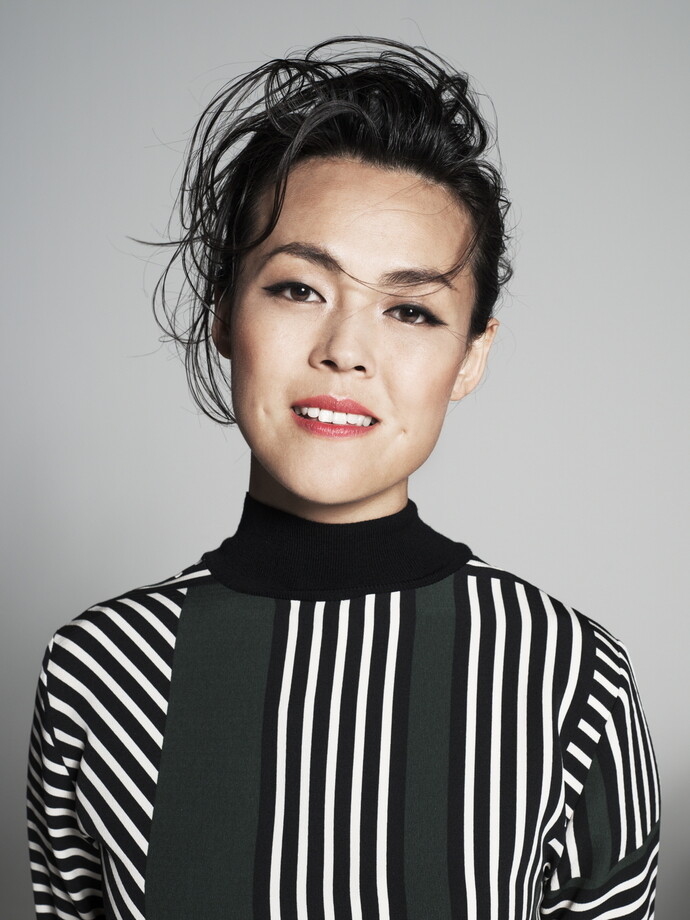hankyoreh
Links to other country sites 다른 나라 사이트 링크
[Interview] World-renowned harpist uses her “foreignness” to create a rich variety of music

The song “Arirang” is an umbilical cord of sorts for Korean culture. It is a simple song, featuring the repeated words, “Arirang, arirang, arariyo” – yet it has the power to bring together Koreans anywhere in the world. World-renowned harpist Lavinia Meijer, 35, was similarly drawn to “Arirang.”
Born in Korea, she was adopted in the Netherlands along with her older brother at the age of two. After encountering “Arirang” during her first-ever visit to South Korea for a 2009 performance, she went on to create and performer her own variations. Imbued with varied emotions of suffering and hope, “Arirang” lent itself to variations that emphasized darker, lighter, and more subtle feelings.
Meijer, who recently released a single version of “Arirang,” shared her variations on the tune during the PyeongChang Winter Music Festival, which opened on Jan. 30. The cool and delicate sounds of the harp strings brought forth a deep sense of the song’s lyricism.
“‘Arirang’ is the song that helped me commune with Korea,” said Meijer on Feb. 6 at the Sony Music office in Seoul’s Gangnam neighborhood.
“Every time I play ‘Arirang,’ I think back to the first connection of my life. I suppose I’ve been influenced by things like my adoption and meeting my biological father when I first came to South Korea,” she said. “People who heard the performance told me, ‘It’s like you saw into the soul.’”

Meijer began studying the harp at age nine. She chose the instrument because she wanted to play something as distinctive as she looked. She turned out to have a gift for it, taking top honors at the 1997 Nederlands Harp Concours and 2000 International Harp Competition in Brussels and winning the 2009 Dutch Music Prize.
The richness of her music stems from a unique background. She and her brother were adopted from South Korea by a Dutch social worker father and Austrian accountant mother after they had given birth to their first daughter. The couple subsequently adopted another child, a boy from Ethiopia who was two years younger.
“Our family is a bit special,” Meijer said with a laugh. “My ‘foreignness’ has helped in making music. There’s a Dutch me and a Korean me, so I get a rich variety of feelings.”
Meijer also performed Yun I-sang “Duo for Cello and Harp” at the PyeongChang Winter Music Festival. She felt especially drawn to Yun’s work, which involves performance techniques in which Western instruments produce sounds reminiscent of the Korean traditional string instruments like the gayageum and geomungo. Meijer, who has played Yun’s work for her degree and in regular performances, described him as a “composer who created excellent works for the harp.”
A connection between the harp and the gayageum
“When I’m playing the harp, I feel like I’m playing the gayageum, and when I hear the gayageum I think of the harp,” she said. “They’re shaped differently, but the two instruments have a connection.”
“When I met [late gayageum player] Hwang Byung-ki a few years ago, I received a book and was able to hear the possibilities for the gayageum,” she recalled. “It was a blessing and an honor.”
After her first appearance at the 2015 PyeongChang Winter Music Festival, Meijer received invitations to perform at this year’s event and the PyeongChang Daegwallyeong Music Festival taking place this July.
“I have nothing but praise to offer,” she said. “Every time I come, the preparations are always perfect and there’s a good program that harmonizes the new and the old.”
“I especially liked the ‘Pyeongchang Song of Heungbu’ pansori (a Korean traditional genre of musical storytelling) performance at this year’s festival,” she added.
While her performance is complete, Meijer plans to defer her departure. She has a film music meeting scheduled and plans to view skiing at the Olympics. With her departure date falling on her Feb. 12 birthday, Meijer said she plans to have a party and visit a singing room (karaoke room) with her friends in South Korea.
“I think singing rooms help you release stress faster than anywhere else. I can understand why Koreans go there,” she said.
“Whenever I go to a singing room, I do Kelly Clarkson songs [with many high notes], and I can’t speak after I finish singing one,” she added with a laugh.
By Kim Mi-young, staff reporter
Please direct questions or comments to [english@hani.co.kr]

Editorial・opinion
![[Column] Park Geun-hye déjà vu in Yoon Suk-yeol [Column] Park Geun-hye déjà vu in Yoon Suk-yeol](https://flexible.img.hani.co.kr/flexible/normal/500/300/imgdb/original/2024/0424/651713945113788.jpg) [Column] Park Geun-hye déjà vu in Yoon Suk-yeol
[Column] Park Geun-hye déjà vu in Yoon Suk-yeol![[Editorial] New weight of N. Korea’s nuclear threats makes dialogue all the more urgent [Editorial] New weight of N. Korea’s nuclear threats makes dialogue all the more urgent](https://flexible.img.hani.co.kr/flexible/normal/500/300/imgdb/original/2024/0424/7317139454662664.jpg) [Editorial] New weight of N. Korea’s nuclear threats makes dialogue all the more urgent
[Editorial] New weight of N. Korea’s nuclear threats makes dialogue all the more urgent- [Guest essay] The real reason Korea’s new right wants to dub Rhee a founding father
- [Column] ‘Choson’: Is it time we start referring to N. Korea in its own terms?
- [Editorial] Japan’s rewriting of history with Korea has gone too far
- [Column] The president’s questionable capacity for dialogue
- [Column] Are chaebol firms just pizza pies for families to divvy up as they please?
- [Column] Has Korea, too, crossed the Rubicon on China?
- [Correspondent’s column] In Japan’s alliance with US, echoes of its past alliances with UK
- [Editorial] Does Yoon think the Korean public is wrong?
Most viewed articles
- 1‘We must say no’: Seoul defense chief on Korean, USFK involvement in hypothetical Taiwan crisis
- 2N. Korean delegation’s trip to Iran shows how Pyongyang is leveraging ties with Moscow
- 3Amnesty notes ‘erosion’ of freedom of expression in Korea in annual human rights report
- 4[Column] Park Geun-hye déjà vu in Yoon Suk-yeol
- 5‘Weddingflation’ breaks the bank for Korean couples-to-be
- 6[Reportage] On US campuses, student risk arrest as they call for divestment from Israel
- 7[Editorial] New weight of N. Korea’s nuclear threats makes dialogue all the more urgent
- 8Korea sees more deaths than births for 52nd consecutive month in February
- 9Will NewJeans end up collateral damage in internal feud at K-pop juggernaut Hybe?
- 10Why Korea shouldn’t welcome Japan’s newly beefed up defense cooperation with US